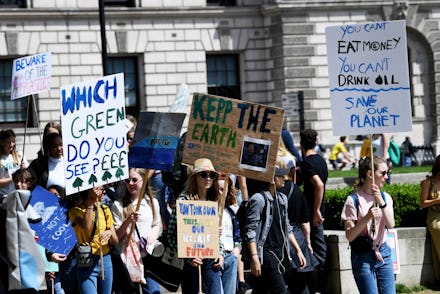The kids aren't alright: U.N. says future generations face "ecological and existential threats"

Last year, millions of kids took part in a global climate protest. The premise of their argument was simple: they are going to inherit an earth that, because of massive amounts of greenhouse gas emissions produced and insufficient environmental policies and action taken by the generations before them, will be in a dire state. As it turns out, the kids are (of course) correct. According to a new research paper from the World Health Organization and the United Nations Children’s Fund (UNICEF), children in every country in the world face “environmental and existential threats” related to human-caused climate change.
A group of 40 scientists analyzed data from 180 countries to determine what nations have done the best job preparing for the future and laying the groundwork to ensure future generations have all of the resources and protections they will need to thrive. They examined a variety of threatens, ranging from the degradation of ecosystems, concerns of war, growing levels of inequality, and other issues that are often caused or exacerbated by climate change. What researchers found is that no country has adequately set children up for a successful future — and those with the most promising present often will require the most dramatic changes in order to reach a more sustainable future.
As one might expect, advanced economies and developed nations stand the best chance at establishing a solid future for their youth. Topping the list are Norway, South Korea, and the Netherlands. All three nations have strong educational systems, good health conditions, and nutrition programs for young people that provide them with a shot at a healthy future. It should come as little surprise that all of these nations are also large contributors to global greenhouse gas emissions. For instance, despite a population of just 51 million — about 0.65 percent of the world's population — South Korea is responsible for nearly 1.5 percent of global carbon emissions. All three nations produce about 10 metric tons of carbon emissions per capita, according to data compiled by the World Bank. Other developed nations including France, Ireland, Denmark, and the United Kingdom all ranked in the top 10 for likelihood of future populations thriving. All of those nations are members of the European Union, which contributes nearly 10 percent of all carbon emissions produced globally and is responsible for the third-most greenhouse gas emissions out of any region.
On the opposite end of the spectrum, the nations projected to have the most troubles for future generations are largely ones that are not contributing much to global greenhouse gas emissions. Children in the Central African Republic, Chad, and Somalia all face the worst odds of survival, according to researchers. This despite the nations all contributing between 0.05 and 0.07 metric tons of carbon emissions per capita. This has unfortunately been one of the forgotten side effects of climate change: as developed nations struggle to change their polluting ways in time to stave off the worst effects of climate change, developing regions are already starting to feel the brunt of the damage. For instance, East Africa has been devastated by unexpected an unprecedented flooding that has been linked to climate change largely caused by advanced economies and not by the region's own doing.
For what it's worth, being a developed nation with an advanced economy does not guarantee future health for the youth. Despite being the second-largest contributor to global greenhouse gas emissions, the United States ranked 39th in the researcher's index, suggesting that Generation Z will have a tough future ahead of them due to the inaction of politicians and leaders in the country. Even in countries like the U.S., it is often less advantaged people living in low-income communities who face the worst effects of climate change.
Addressing climate change will truly require a global effort if anything is likely to be accomplished. Nations that have spent decades relying on dirty-burning fuels to push their economies forward have given themselves advantages that developing nations won't be able to utilize, and many of the worst effects of human-caused climate change will first fall on regions that are not equipped to deal with them. Without a significant undertaking by advanced economies, already disadvantaged people are likely to be suffer. No wonder kids are taking to the streets.